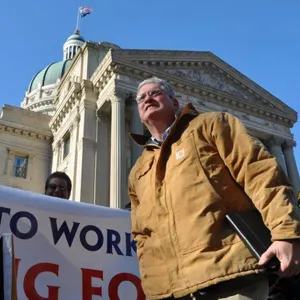Monopoly Bargaining Strips Employees, Not Union Bosses, of ‘Valuable Rights’


Officers of Local 150 of the IUOE union like Financial Secretary David Fagan insist they are constitutionally entitled to seize forced fees from employees who don't want a union.
Top officials of the suburban Chicago-based Local 150 of the International Union of Operating Engineers (IUOE/AFL-CIO) are coming in for some well-deserved mockery for outrageous claims they have recently made as part of their bid to get Indiana’s state Right to Work law overturned in court. The Indiana statute, which was signed by Gov. Mitch Daniels February 1 and took effect in March, prohibits the firing of employees for refusal to pay dues or fees to an unwanted union.
In a complaint filed in federal court in February, Local 150 union lawyers claimed that, since Big Labor pours a substantial amount of the forced-fee money it extracts from union nonmembers in forced-unionism states into electioneering and lobbying, Indiana’s Right to Work law violates union bosses’ First Amendment right to participate in the political process! Of course, as the U.S. Supreme Court noted in its 2007 Davenport ruling, argued and won by National Right to Work Legal Defense Foundation attorneys, union bosses have no First Amendment “right†whatsoever to confiscate money from employees who choose not to join a union, regardless of how the union brass intend to spend the money.
In an amended version of the complaint filed this month, discussed in the Big Government blog post linked above, Local 150 union lawyers contend that revoking their privilege to force union nonmembers to pay fees as a condition of employment effectively consigns union officials to “involuntary servitude,†and thus violates the Thirteenth Amendment of the U.S. Constitution.
This jaw-dropping assertion is based on a bizarre presupposition about the provisions in the National Labor Relations Act (NLRA) empowering Big Labor to force employees who don’t want a union and refuse to join one to allow it nevertheless to be their “exclusive†spokesman in all negotiations with their employer concerning their pay, benefits, and other working conditions. The presupposition is that these monopoly-bargaining powers constitute a “burden†on union officials. In exchange for carrying this “burden,†Local 150 union lawyers contend, Big Labor is constitutionally entitled to collect forced union fees from union nonmembers.
This sets the truth on its head. As the High Court bluntly explained in American Communications Association v. Dowds (1950), the NLRA’s purpose in authorizing “exclusive†union bargaining is to foster “strong unions,†not to provide any benefit to employees who don’t wish to be unionized. In fact, under the NLRA, “individual employees are required by law to sacrifice [bargaining] rights which, in some cases, are valuable to them.†To force such workers to pay fees to the unwanted union for the “privilege†of losing their personal bargaining rights is to add insult to injury.

